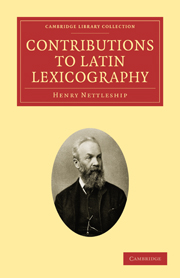Summary
The position of the vocal organs in pronouncing this letter is thus described: Marius Victorinus p. 32 K e depresso modice rictu oris reductisque introrsum labris effertur; Terentianus Maurus p. 329 K e … deprimit altum modico tenore rictum; Martianus Capella 3. 261 e spiritus facit lingua paullulum pressiore. Ē is said by the grammarians to approach the sound of i; e to approach the sound of the diphthong ae: Serv. in Don. p. 421 K, Sergius in Don. p. 520 K. (For a full discussion of this point see Seelmann pp. 175 foll.)
E stands as an abbreviation for exemplum, egregius, egregiae, est, ex.
Ēbītō, -ĭs, to go out (e, baeto): given by all the MSS. of Plautus (apparently including A), in Plaut. Stich. 608 R tanto opere suades ne ebitat. Ebitere is quoted from glossaries by Löwe Glossae Nominum p. 102, and he would (perhaps rightly) read ebitat in the passage of Plautus; the most recent edd. however keep bitat.
Ēbrĭetās, in the sense of an intoxicating drink: Itala 1 Reg. (= 1 Sam.) 1. 15 vinum et ebrietatem non bibo (Rönsch S. B. p. 28).
Ēclŏgă, -ae (ἐκλογή), a selection: Varro Epistulicae Quaestiones ap. Charis. p. 120 K eclogas ex annali descriptas. Comm. Cruq. Hor. 2. S. 1. 1 preserves the following notice: ‘ecloga’ haec nomina sub se continet: si ad Iovem, prosodia dicuntur: si ad Apollinem, Dianam, aut Latonam, paeanes: si ad Liberum aut Semelen, dithyrambi: si ad ceteros deos, hymni: si ad homines laudandos, vituperandos, regendos, odae sunt et eclogae, sunt enim brevia poematia.
- Type
- Chapter
- Information
- Contributions to Latin Lexicography , pp. 444 - 452Publisher: Cambridge University PressPrint publication year: 2010

